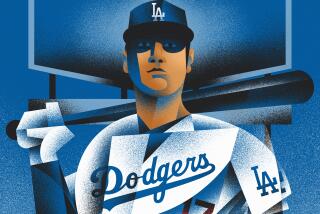A Loose Cannon : JetHawk Has Talent--for Hitting and Throwing Tantrums
- Share via
LANCASTER — Shane Monahan is irony in spikes.
The JetHawk outfielder’s biggest strength and his biggest weakness are the same thing--his intensity.
On one hand, it drives him full speed toward an almost inevitable spot in the major leagues. But it also drives teammates and managers crazy.
Monahan plays angry, and you can’t argue with the results so far. He was an All-American at Clemson and now, the 22-year-old with major-league speed and a major-league arm is one of the top outfield prospects in the Seattle Mariner organization. This season with the JetHawks he’s hitting .288 with 13 home runs, 91 runs batted in and a California League-leading 11 triples.
But when many people think of Shane Monahan, what comes to mind is not him hitting a home run, stealing a base or throwing out a runner at home plate.
They think of a thrown helmet.
It’s how Monahan chooses to vent the aggression that overflows in his 6-foot, 195-pound body after things don’t go his way on the field.
Monahan knows he shouldn’t do it. Knows his manager, his teammates and opponents get a little tired of it. But he also knows--and so do they--that he wouldn’t be the same without it.
“That’s a lot of my game,” he said. “I play better when I’m mad.”
Monahan, who is relaxed and generally pleasant to be around off the field, is searching for the delicate balance of “controlled aggression.” With the calming influence of Joelle Monahan, his wife of nine months, he appears to be making progress.
“It seems like he’s grown up a lot in the last year,” said JetHawk reliever John Daniels, who was Monahan’s roommate last season with the Wisconsin Timber Rattlers. “I think it’s helped his play in the field. I think he needs some anger, but when he’s under control, he’s even better.”
But he still has some work to do.
“He doesn’t accept defeat very well, and I guess you’d rather have it that way than someone who accepts defeat and accepts failure,” said JetHawk Manager Dave Brundage. “But he’s going to have to learn down the road that in order for him to play in the major leagues, he’s going to have to tone it down. He’s going to have to be in control.”
The genesis of the aggression is clear. Monahan grew up around hockey, not baseball. His great-grandfather, Howie Morenz, and his grandfather, Bernie (Boom Boom) Geoffrion, are in the NHL Hall of Fame. His father, Hartland Monahan, played nine seasons in the NHL.
“It was stressed to me from an early age, by both my grandfather and my father, that if you are going to play a sport, you have to give it 110%,” Monahan said. “You have to play hockey that way. It’s not like you can be Mr. Mellow on a hockey rink.”
Monahan also plays with tremendous confidence. This is a guy who cried when he learned he slipped in the draft all the way to the second round.
“It sounds cocky and arrogant,” he said.”But I know I can play.”
Which is why Monahan could go four for five, but still kick a chair in the dugout after the one time he makes an out.
“Thirty percent of the time he’s [getting a hit] and that’s a success,” Brundage said. “But he doesn’t think like that.”
*
Monahan thinks like a hockey player.
Monahan grew up in NHL locker rooms, following his dad’s career with six teams, including the Kings. He wandered around the dressing room as a youngster, getting thrown into laundry hampers by the players.
“He would come into the locker room and see all the guys banged up and they would roughhouse with him,” Hartland Monahan said. “He kind of learned that the aggressive part of the game is a big part.”
Monahan, who skated alongside the NHL players at some of his dad’s practices, stopped playing hockey at age 13, after the nearest ice rink to his home in suburban Atlanta closed. He turned his attention to baseball, a sport in which he seemed to have a natural talent.
He told his hockey elders: “I know you guys were great hockey players, but I kind of want to make it in my own sport.”
That he did. During his senior year of high school, he received scholarship offers from several top-notch college baseball programs in the Southeast before settling on Clemson.
In three seasons with the Tigers, he was a two-time All-American and Atlantic Coast Conference most valuable player his junior year, when he hit .394. He was a finalist for the Golden Spikes Award, given to college baseball’s player of the year.
As last summer’s draft approached, scouts told Monahan he would be picked anywhere from 10th to 27th in the first round. No one said anything about the second round, so when the Seattle Mariners took Monahan with the third pick in the second round, 33rd overall, he was crushed.
“It broke my heart at first,” he said. “I was basically in tears.”
That’s where Monahan’s wife, Joelle, who was his girlfriend at the time, assumed what is now her familiar role: setting Shane straight.
She called him and convinced him he was silly for complaining about being picked in the second round, that he’d still get plenty of money--a $315,000 bonus, as it turned out--and a chance to prove he belonged in the majors.
“She’s always there,” Monahan said. “I start to wander off and she’s right there to put me back in line.”
*
Joelle has been putting Shane back in line for nearly four years. When they met, Shane introduced himself as “Shane Monahan, baseball player.”
His celebrity status around campus didn’t impress Joelle, a cheerleader. She had heard stories about Clemson baseball players and generally chose to avoid them.
“I think I was a lot different toward him than everyone else in his world was,” Joelle said. “Everyone treated him like he was great, no matter how mean to them he was. I don’t think I treated him like he was great. I treated him like he was a person. I didn’t change the way I was just because he was Shane Monahan.”
Which is what Monahan liked about Joelle. And didn’t like.
“I was always intimidated by her,” said Monahan, who doesn’t seem intimidated by anything on a baseball field. “I thought she was one of the best-looking girls in school and I never thought she’d go out with me.”
They were friends for two years before they dated. A year later, they were engaged, and four months after that, they were married.
Joelle has helped Shane realize there is more to life than baseball, and more to baseball than putting life-and-death emphasis on each at-bat.
“I’ve tried to show him how the game looks to people who don’t play, to give him a little enlightenment from the other side,” Joelle said. “There are certain things I respect about players. I like the ones who go out and play hard, but there are things you just don’t do. I don’t enjoy seeing guys throw helmets and break bats.”
*
Monahan’s teammates have seen plenty of thrown helmets and bats, but they seem to tolerate his antics because he produces.
“It gets old, but that’s just the way he is,” JetHawk pitcher Brett Hinchliffe said. “He’s a great player. You just have to take the good with the bad.”
Another teammate, requesting anonymity, said: “There is a line where he’s overdoing it, like when he’s yelling at the other team. I think that makes him look bad.”
Brundage has had his share of meetings with Monahan to help him check his emotions.
“I want him to learn because I want him to be able to go on and play 10 years in the major leagues, because he’s certainly capable of it,” Brundage said. “If you are on a roller coaster, up and down, up and down, it can only take away from your game. It can only be a detriment at times when you are failing. . . .
“If you are going to put that kind of emphasis on every single at-bat, you are not going to last in the game of baseball for a long time.”
Monahan recently sat in an empty clubhouse and explained how he’s sorry when he sets a bad example for kids. He’s making an effort to maintain the intensity without the displays of anger, even though he still slips.
“It’s taken me a whole year,” he said, “and I guess I’m starting to learn now.”
More to Read
Go beyond the scoreboard
Get the latest on L.A.'s teams in the daily Sports Report newsletter.
You may occasionally receive promotional content from the Los Angeles Times.










